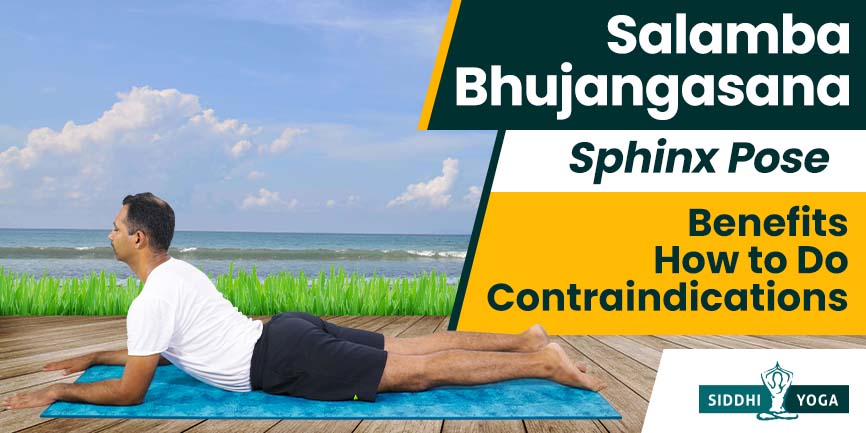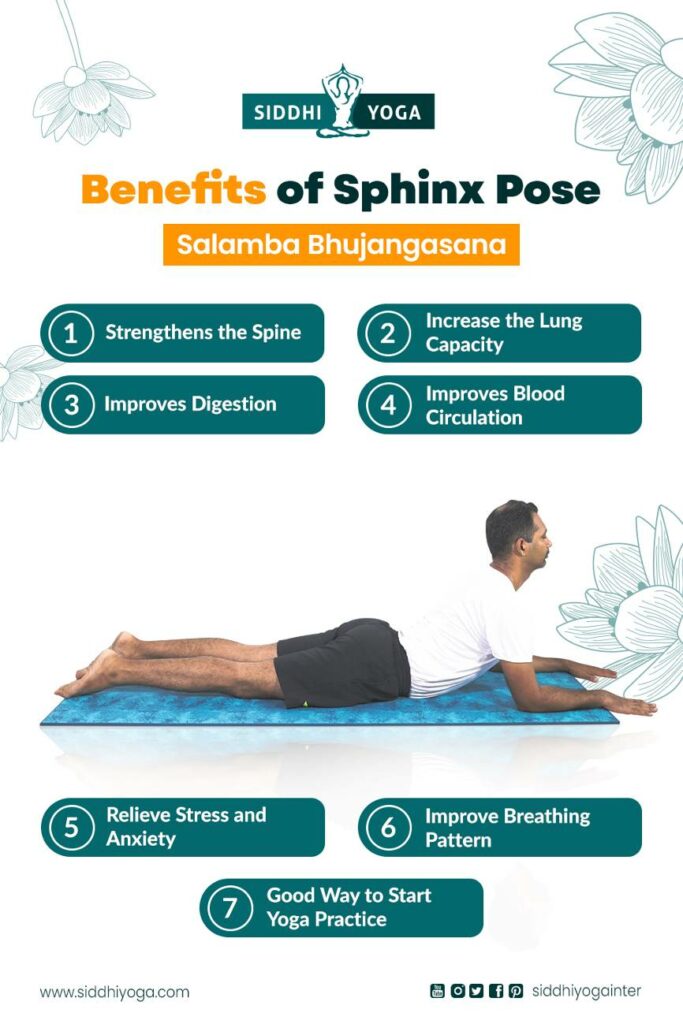
Bhujanga = Cobra
Asana = pose; posture
Salamba Bhujangasana at a Glance
Sphinx pose, or Salamba Bhujangasana, is a relaxing, restorative, mild backbend pose. The name “Sphinx Pose” can refer to the iconic Mystical Sphinx in Egypt (a mythical creature with the body of a lion and the head of a human), which is the balance between physical strength and inner calm.
Benefits:
- It helps to improve posture.
- It helps to relieve stress and tension.
- It improves your spinal flexibility.
- It helps to open up your chest and strengthens your core muscles.
Who can do it?
Beginners of any age having normal health can do Sphinx Pose. People looking to improve their posture and relieve mild back pain can do this. People with everyday stress and tension can do this to reduce it. Individuals with irregular bowel movements can do this asana.
Who should not do it?
People suffering from spinal injuries should avoid it. Pregnant women should avoid doing it. People with severe headaches should try to avoid it. Individuals with any fracture in the hip or wrist should avoid Sphinx Pose.
How to Do Salamba Bhujangasana?
Follow the Step-by-Step Instructions
- Lie on the yoga mat in the prone position on your stomach, resting on the forehead and stretching your arms alongside or forward.
- Take a few gentle breaths and feel the tummy touching the floor while you inhale and connect between the body and breath.
- Now, bring your feet together, soles facing upward.
- Inhale deeply and slide down your arms, towards your body, and elbows placed just below the shoulders and palms facing down, resting near your face and breathing out, keeping your forehead on the mat.
- Now, inhale deeply and lift your head, gently arching your back with the support of the forearms and pressing the palms to the ground.
- Now, exhale and bring your shoulders back, away from the ear, opening your chest, your head raised to the ceiling, and your chin slightly raised.
- Gaze up slightly, breathe deeply and gently, and push the stomach to the floor with every breath. Be aware of the breath and the lower back opening with every breath.
- Keep your core muscles engaged, and gently tuck your tailbone under to support your lower back.
- Breathe deeply and hold the pose for a few breaths, keeping a gentle lift in your chest and arching your upper back.
- When you release the pose, exhale slowly, lower your chest, and head back to the ground.
- Be in the Resting Child’s Pose or Corpse Pose (Savasana) to relax.
What are the Benefits of Salamba Bhujangasana?

- Sphinx Pose helps open up your chest, increases your lung capacity, and helps you breathe deeper.
- It stretches and strengthens the spine and hip flexors and improves flexibility.
- Sphinx Pose also engages your abdominal muscles and helps to relieve constipation.
- This helps to relieve stress and tension in the upper back and the shoulders.
- This pose can help to improve your emotional state and boost your energy (it calms the nervous system).
Health Conditions that Might Benefit from Salamba Bhujangasana
This can be helpful to people with mild back pain and individuals who want to improve their posture. People with much stress and tension in the upper back and shoulders can benefit from this pose. This stimulates your abdominal organs. This could be helpful for people looking out to relax their mind and body.
Safety and Precautions
Avoid doing Sphinx Pose if you have severe back pain. Be careful if you had any recent abdominal surgery, back injuries, or carpal tunnel syndrome. Avoid any discomfort in the lower back. For any health concerns, consult your health care professional.
Common Mistakes
- Avoid overarching your lower back
- Don’t raise your head too high.
- Avoid dropping your shoulders
- Engage your core.
Tips for Salamba Bhujangasana
- Don’t strain while lifting your chest, be gentle.
- Elbows should be under the shoulders.
- Keep your neck relaxed.
- Take deep breaths, and don’t hold your breath.
- Use props to support your arms if needed.
- Do this pose only when your stomach is empty.
Physical Alignment Principles for this Sphinx Pose
- Your forearms should be shoulder-width apart.
- Elbows under your shoulder blades and press the chest forward.
- Legs hip width apart, soles of feet facing upward, and top of the feet pressing upward and spread the toes.
- Palm facing the ground.
- Engage your core, press the pubic bone down and engage the legs firmly.
- Roll your outer thighs toward the floor.
- Keep the neck neutral and slightly upward, and breathe gently.
- To release, gently lower your torso, chest, and head to the earth on an exhale.
Breath and Salamba Bhujangasana
Keep your breath with the movement of the body for this yoga practice. Relax and take a deep breath before getting into the pose. Inhale deeply as you lift the chest, and feel your belly touching the floor with every inhale. As you exhale, take your shoulders back and bring your chest out. Keep a gentle breath throughout the process. While you release, exhale, and bring your head down, feel the relaxation and let go of your stress and tension with the breath out.
Variations of Salamba Bhujangasana
You can do variations like-
- Half Sphinx Pose
- Elevated Salamba Bhujangasana
- Twisted Salamba Bhujangasana
- Dynamic Salamba Bhujangasana
Take Away
This is a relaxing pose. This is a gentle backbend pose that every beginner can do it. It gently opens your chest, helps with mild back pain, and massages your abdomen muscles, reducing constipation and bloating. For any health concerns, contact your healthcare professional for guidance. There are variations for everyone, from simpler poses to challenging (deeper backbend) poses.
Yoga is not just a practice; it’s a way of life. Take the first step towards a meaningful career by enrolling in our comprehensive Online yoga teacher training courses. Choose from 200 Hrs Yoga Teacher Training, 300 Hrs Yoga Teacher Training, or 500 Hrs Yoga Teacher Training Programs – all crafted to help you master the art of teaching yoga. Embrace your passion, become a certified yoga instructor, and empower others to find their inner peace and strength.
Responses